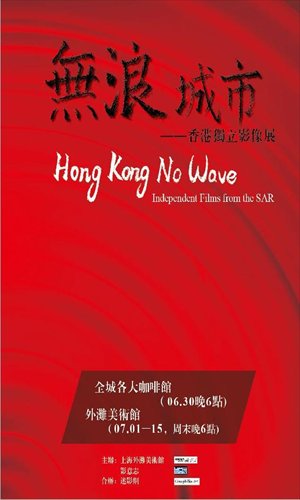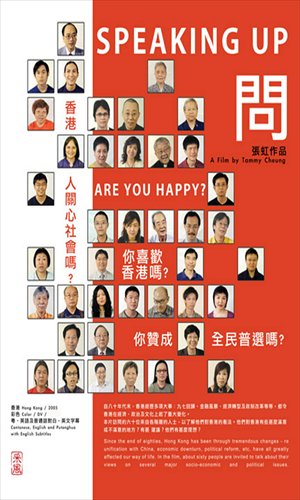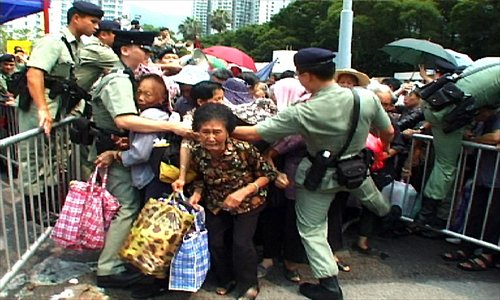HOME >> METRO SHANGHAI
On the crest of a wave
By Hu Bei Source:Global Times Published: 2012-7-16 17:35:03
Mention the Hong Kong film industry, and images of martial arts or cops-and-robbers capers usually spring to mind. But the city's filmmakers are keen to point out that there is a lot more to the city's movie scene as witnessed by a boom in independent films in recent years. They add that these films give a glimpse into the lives of ordinary Hong Kong people.
The themes these films address include that of Hong Kong's "identity," 15 years after its return to the motherland after a century of colonial governance from the UK.

Posters for the Hong Kong "indie" films screening event Photos: Courtesy of Wu Jueren
Film showcase
Under the title of Hong Kong No Wave, some of these "indie" films, all made since 2000, are being screened at the Rockbund Art Museum on Yuanmingyuan Road until July 20. This is the first time any of these films have been shown in the city. The films have been selected by Ying E Chi (which also made some of them), a non-profit independent organization which was formed in Hong Kong in 1997 by a group of filmmakers.
According to the festival curator Wu Jueren, the Hong Kong independent film scene has experienced three stages: the first was the initial development period in the 1960s to 1970s; the second was a downturn in the industry in the 1980s; and the third was the post-1990s boom period helped by the introduction of government financial support.
"Hong Kong independent films show a side of the city which you can not always see in mainstream films," Wu said. "That is why we want to show them here, to let Chinese people outside of Hong Kong see the reality of life there. Whether they are documentaries or fictional films, they are all very closely connected with Hong Kong citizens. To some extent, Hong Kong independent directors are more like social workers than filmmakers. Almost every large social or political event that has happened recently in Hong Kong has inspired somebody to make a film about it."
Moving (2004) and Election (2008) are two documentary films being shown. Moving is about a public relocation project in Ngau Tau Kok Estate, one of the oldest and largest housing projects in Hong Kong.
Since 2001, when the government announced its plan to redevelop the area, residents have been gradually relocated to new housing estates. This film was shot in five months and followed social workers who worked with the displaced residents, offering a glimpse into the lives of the many older people affected.
Film showcase
Under the title of Hong Kong No Wave, some of these "indie" films, all made since 2000, are being screened at the Rockbund Art Museum on Yuanmingyuan Road until July 20. This is the first time any of these films have been shown in the city. The films have been selected by Ying E Chi (which also made some of them), a non-profit independent organization which was formed in Hong Kong in 1997 by a group of filmmakers.
According to the festival curator Wu Jueren, the Hong Kong independent film scene has experienced three stages: the first was the initial development period in the 1960s to 1970s; the second was a downturn in the industry in the 1980s; and the third was the post-1990s boom period helped by the introduction of government financial support.
"Hong Kong independent films show a side of the city which you can not always see in mainstream films," Wu said. "That is why we want to show them here, to let Chinese people outside of Hong Kong see the reality of life there. Whether they are documentaries or fictional films, they are all very closely connected with Hong Kong citizens. To some extent, Hong Kong independent directors are more like social workers than filmmakers. Almost every large social or political event that has happened recently in Hong Kong has inspired somebody to make a film about it."
Moving (2004) and Election (2008) are two documentary films being shown. Moving is about a public relocation project in Ngau Tau Kok Estate, one of the oldest and largest housing projects in Hong Kong.
Since 2001, when the government announced its plan to redevelop the area, residents have been gradually relocated to new housing estates. This film was shot in five months and followed social workers who worked with the displaced residents, offering a glimpse into the lives of the many older people affected.

Posters for the Hong Kong "indie" films screening event Photos: Courtesy of Wu Jueren
Future identity
Election is about the legislative council elections that took place in 2004. It follows the pre- and post-election activities, from the submission of candidates and pledge ceremonies to candidates lobbying and debating at forums, and right up to the final voting. The film reflects the problems Hong Kong faces as it carves out its future political identity in the face of conflicting interests.
Tammy Cheung directed both films, and has been prominent in the city's film industry since the 1990s. Cheung said that when she was young, she actually wanted to be a social worker but felt the job would be too difficult. Before becoming a documentary filmmaker, Cheung studied sociology, and did various jobs including prison guard, government official, teacher and journalist.
An earlier documentary work of Cheung's, Rice Distribution (2003), is also being screened. Rice Distribution is the name of one of the largest charity events in Hong Kong and takes place annually during the seventh lunar month of the Ghost Festival (a festival popular in South China where the spirits of dead ancestors are said to come out from the lower realms of existence). During this event, many charity organizations in Hong Kong give rice to the elderly and the poor. The rice distribution event in 2002 detailed in the film attracted more than 8,000 participants.
Cheung began to become more interested in old people's issues precisely because of this charity event.
"I wanted to know what was happening in their lives, and where many of their adult children were. It was like nobody was taking care of them," said Cheung.
The Chinese-Canadian film director, Quentin Lee's first documentary film, No Wave was shot in 2007, 10 years after Hong Kong's return to the motherland. In the film, the director interviews outstanding artists and filmmakers including Kam Kwok Leung, Peter Chan and Teddy Chen about the city's cultural identity.
Future identity
Election is about the legislative council elections that took place in 2004. It follows the pre- and post-election activities, from the submission of candidates and pledge ceremonies to candidates lobbying and debating at forums, and right up to the final voting. The film reflects the problems Hong Kong faces as it carves out its future political identity in the face of conflicting interests.
Tammy Cheung directed both films, and has been prominent in the city's film industry since the 1990s. Cheung said that when she was young, she actually wanted to be a social worker but felt the job would be too difficult. Before becoming a documentary filmmaker, Cheung studied sociology, and did various jobs including prison guard, government official, teacher and journalist.
An earlier documentary work of Cheung's, Rice Distribution (2003), is also being screened. Rice Distribution is the name of one of the largest charity events in Hong Kong and takes place annually during the seventh lunar month of the Ghost Festival (a festival popular in South China where the spirits of dead ancestors are said to come out from the lower realms of existence). During this event, many charity organizations in Hong Kong give rice to the elderly and the poor. The rice distribution event in 2002 detailed in the film attracted more than 8,000 participants.
Cheung began to become more interested in old people's issues precisely because of this charity event.
"I wanted to know what was happening in their lives, and where many of their adult children were. It was like nobody was taking care of them," said Cheung.
The Chinese-Canadian film director, Quentin Lee's first documentary film, No Wave was shot in 2007, 10 years after Hong Kong's return to the motherland. In the film, the director interviews outstanding artists and filmmakers including Kam Kwok Leung, Peter Chan and Teddy Chen about the city's cultural identity.

A film still from Rice Distribution, an independent film being screened in Shanghai
Points of view
Vincent Chui is another outstanding director from Hong Kong and he has two films being screened in Shanghai: Three Narrow Gates (2008) and Leaving in Sorrow (2008). These films highlight Hong Kong life through portrayals of various occupations such as a police officer, a newspaper journalist, and a priest.
Chui told the Global Times that he is not concerned whether his films enter the mainstream market of the movie industry. "What's important to me is to provide a multitude of points of view for Hong Kong people to express themselves freely."
Zhang Xianming, an independent film critic on the Chinese mainland commented that the social topics discussed in Hong Kong films resonate strongly with ordinary people.
"And this is something that independent filmmaking on the Chinese mainland still lacks," he said.
Points of view
Vincent Chui is another outstanding director from Hong Kong and he has two films being screened in Shanghai: Three Narrow Gates (2008) and Leaving in Sorrow (2008). These films highlight Hong Kong life through portrayals of various occupations such as a police officer, a newspaper journalist, and a priest.
Chui told the Global Times that he is not concerned whether his films enter the mainstream market of the movie industry. "What's important to me is to provide a multitude of points of view for Hong Kong people to express themselves freely."
Zhang Xianming, an independent film critic on the Chinese mainland commented that the social topics discussed in Hong Kong films resonate strongly with ordinary people.
"And this is something that independent filmmaking on the Chinese mainland still lacks," he said.
Posted in: Metro Shanghai